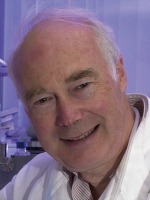 Cell Therapy has posted positive data from a Phase II trial of its topical regenerative medicine to repair severe tendon injury. And with mid-stage data in the bag and a sizable potential market awaiting commercialization of the product, the regenerative medicine specialist is now assessing its partnership options.
Cell Therapy has posted positive data from a Phase II trial of its topical regenerative medicine to repair severe tendon injury. And with mid-stage data in the bag and a sizable potential market awaiting commercialization of the product, the regenerative medicine specialist is now assessing its partnership options.
 |
| Cell Therapy co-founder Sir Martin Evans |
Cardiff, United Kingdom-based Cell Therapy tested the drug--Tendoncel--in 34 patients with the severe tendon injury known as chronic grade 3 lateral epicondylitis. The biotech was looking for signs of improvement on two validated scales, namely DASH (Disabilities of the Arm, Shoulder and Hand) and PRTEE (Patient-Rated Tennis Elbow Evaluation). Participants received 21 days of treatment with Tendoncel or a placebo gel, after which Cell Therapy assessed their improvements against the two scales at the 6-week and three-month points.
Tendoncel was associated with a 70% improvement in DASH. PRTEE improved by 74%. Cell Therapy views the data as clinically--as well as statistically--significant, meaning the next question is how to make Tendoncel available to the 30 million patients a year who suffer from severe tendon injury. The numbers involved mean Cell Therapy wants to team up before advancing. "A high quality partner or partners will be required to commercialize Tendoncel," Cell Therapy CEO Ajan Reginald told FierceBiotech. "There is a good dialogue with potential Big Pharma partners."
The pitch Cell Therapy is making to potential partners--and that it hopes to make to customers--is that Tendoncel can outperform injectable tendon injury treatments in terms of efficacy and ease of administration. Cell Therapy has designed Tendoncel to achieve these objectives by mixing a soup of platelet growth factors such as PDGF-BB, VEGF, PDGF-AA, thrombospondin and angiopoietin into a gel. The resulting allogeneic regenerative medicine is associated with an increase in the growth of fibroblasts in in vitro tests.
Generating clinical data to back up the hypothesis underlying Tendoncel marks another step in Cell Therapy's attempts to live up to the interest in the company. To date, Cell Therapy has been better known for its A-list founders--notably Nobel laureate Sir Martin Evans--and its use of crowdfunding to raise £691,000 ($1.1 million) than its data. But having wrapped up trials of Tendoncel and its lead candidate--the heart failure drug Heartcel--Cell Therapy is now starting to gather hard evidence to support its science.
- read the release